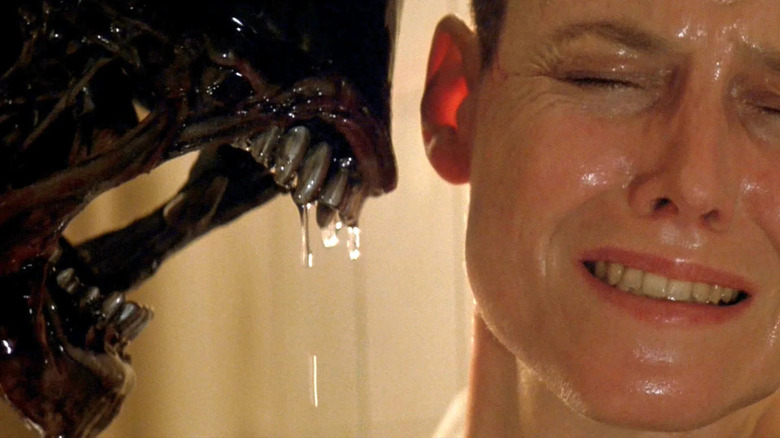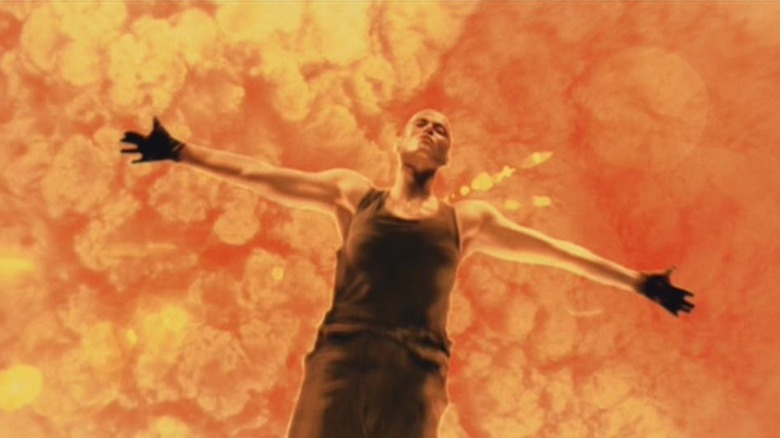Why Sigourney Weaver Wanted Alien 3 To Be The End For Ellen Ripley
"Alien 3" isn't the most beloved film in its legendary sci-fi horror franchise. Nevertheless, it still seemed like the best film to end Ellen Ripley's journey, and Sigourney Weaver, who played the iconic protagonist, felt the same way.
In this third film, directed by David Fincher, Ripley wakes up from hypersleep 57 years after defeating the Alien Queen and finds herself on a maximum-security prison inhabited only by men. She learns that two of her companions, the young girl Newt and fellow soldier Hicks, died during cryonic status, and a facehugger was released on her ship, which leads to the creation of another alien for her to fight.
Though Ripley's journey arguably should've ended after "Aliens," everything she went through in the third film proved that it was time for her character to say goodbye. In an interview with the Chicago Tribune, Weaver discussed Ripley's character in the film, saying:
"There's only so much bad luck that a person can have. For her to continue to wake up and confront the alien and resolve the situation, then go back to sleep and wake up to yet another situation — to me, it's a burden on the whole science-fiction premise of the alien."
"Alien 3" ends with Ripley throwing herself into a burning furnace to destroy the Alien Queen embryo inside her to prevent the Weyland-Yutani corporation from weaponizing it. "This is Ripley's last one," said Weaver. While this is technically true, Weaver did return as a clone of Ripley in the sequel, "Alien Resurrection."
'I feel very complete about her'
When discussing her work in "Alien 3," Weaver said:
"I always hope that the thing I've just done is my best work. I don't want to sound conceited, but I think this is. I think it's some of my most centered work. I think I'd be very sad if I'd done my last work as Ripley and not taken it to this extreme."
While Weaver may have given an excellent performance, not many people agreed that this was her best film. "Alien 3" released to mixed reviews, with even Fincher himself disowning it, saying to The Guardian in 2009, "To this day, no one hates it more than me."
The film's divisive quality resulted from its troubled production, which included many rapid script rewrites and the studio forcing Fincher to cut and reshoot multiple scenes. However, the decision to kill off fan-favorite characters Newt and Hicks all but doomed the film before it even began.
Though "Alien 3" ended Ripley's journey as a maternal figure with Newt's death, Weaver still approved of Fincher's decision, as it took Ripley in a bold new direction while making his sequel more similar to the first film, saying:
"I was just a little wary because I wanted to break new ground with Ripley. You know, you never know with these sorts of geniuses where the attention is going to go. But Fincher, particularly, I think blew us all away by being such a committed actors' director and so patient. And I think we did break new ground with Ripley."
Weaver's hesitation about Fincher was understandable, as this was Fincher's first big-budget film as a director. It wasn't until the release of "Seven" three years later that Fincher solidified his reputation as a master of filmmaking.
Though "Alien 3" was slammed by critics and casual moviegoers, Weaver was still satisfied by how it capped off her character as a lone survivor in a harsh and unforgiving universe. "I feel very complete about her," she said. "I think she's more vulnerable. I think she is truly alone. It's very interesting to play a character who is truly alone, especially a woman, because men are always seen in relation to men or to other women. It was a very — not to put our audience off — but it was a very existential situation in many ways."

